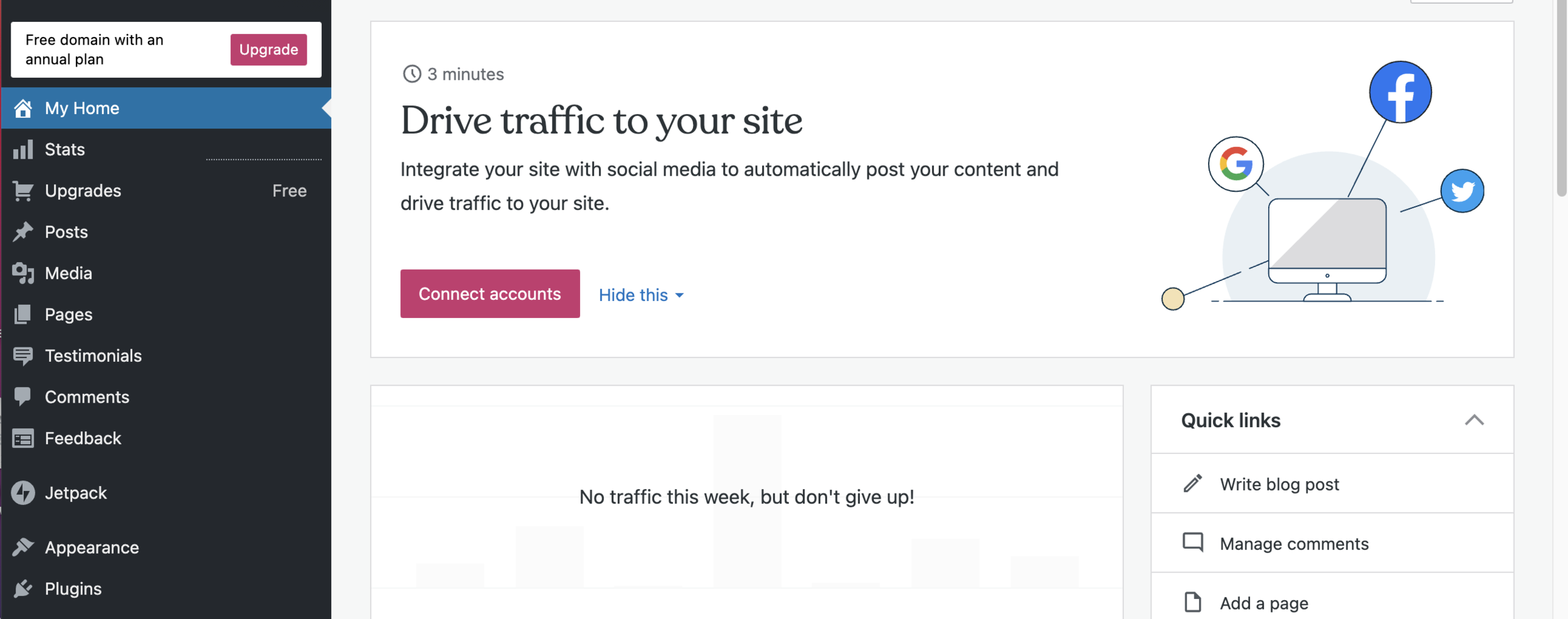WordPress or Squarespace?
Having spent years teaching myself to navigate my way around WordPress, I recently delved into the world of Squarespace. Bearing in mind that I was a die hard fan of the WordPress platform, you may wonder what on earth prompted the switch.
When I look back, the reality of going down the WordPress route was not so much a considered decision as a lack of alternatives decision! However, in more recent times, the world of website design has been shaken up with a few more alternatives and something I thought was a new kid on the block.
I first started hearing about Squarespace in 2018 (although the company was actually founded back in 2003). Over time, I noticed that many of the websites I liked had been built via Squarespace, giving them a modern, fresh and clean look. Also, the people who were using Squarespace sang its praises from lofty heights.
It made me consider moving to Squarespace myself, so I started looking into the differences and reading blog posts which compared WordPress and Squarespace.
What I found was a confusing amount of information which gave no clear way forward. Each platform had their own devotees who were keen to fly the flag for their preferred choice and with no personal knowledge of using Squarespace, it made comparison really difficult.
So when a client asked me to build their website in Squarespace, I dove right in!
With my new found experience, I decided to throw my two penneth into the 'WordPress or Squarespace' debate with the aim of giving some impartial and practical experience of the two platforms.
Here goes.....
[spoiler alert: there is no clear choice, it depends on a number of factors]
1. Ease of Use
Whilst you might contract someone else to actually build your website, you'll still need to have a basic knowledge of how to use and update it yourself.
WordPress can take a little time to learn. In my experience, it's pretty simple to use once you have the hang of it and have picked up on the terminology. However, on first look, the home dashboard can be a intimidating
Compare this with the Squarespace main menu layout and it's clear to see why this platform has a reputation for ease of use with people who have no technical background. The analytics are easy to find (unlike WordPress) and the interface is a drag and drop system which is designed for DIY website builders.
2. Price
When you're starting out, price is a massive consideration. That said, if you choose the wrong platform, you'll be paying for it in the long term.
As an example, you can set up a website completely free on WordPress.com
If you're happy with 'wordpress' in your website name (eg. mywebname.wordpress.com) and are not worried about WordPress adverts popping up all over your site, you can do all that without incurring a penny.
However, if you're building a business, you'll want something more professional looking and that's where the costs start to add up.
WordPress.com is a free site and you can pick up all kinds of free templates to design your website, but then you'll incur extra costs to map your own domain (ie. make it mywebname.com), get rid of adverts and add videos, email and analytics.
To give you an idea [prices correct in early 2019] , a basic package where you get rid of adverts for WordPress.com will cost around £38/year. To have analytics, you'll be looking to pay around £235/year.
As a business, you'll probably want to look at the professional WordPress.org platform instead - yep, just to confuse things, WordPress.com and WordPress.org are two separate entities.
To get set up on WordPress.org, you'll need to buy 3 main things:
Domain Name (approx £10/year);
Hosting (you'll find a wide range of costs from £1.50/month to £10/month, so let's go mid range and say £60/year);
WordPress Theme (there are lots of free ones, although many organisations will purchase a theme which works better for them).
The grand total comes to £70/year unless you decide to purchase a theme too.
Squarespace has 2 packages to consider (£120/year or £180/year), with a free domain name for the first year. Everything is included, making it easy to understand. However, one of Squarespace's big disadvantages comes when you have multiple websites.
Their pricing means that you pay the fee per website, regardless of how many you have. Even with the basic package, you'll be paying £120/year for each website, so the costs can really build if you run several websites. Compare this to WordPress.org where you can buy a hosting package for a relatively low monthly fee, often giving you the option of hosting up to 3 websites.
3. DIY
There's no getting away from the fact that WordPress has a steep learning curve and can take some time to get to grips with.
Building a basic website, even without extra plugins for additional functionality, can be overwhelming. Whenever I've become stuck, I turn to Google as the WordPress help function is basically a support forum. I'm thankful that I have a basic understanding of terminology, the back end operation of WordPress and simple HTML coding when searching through Google as it means that I tend to understand what people are saying.
To get dedicated help on WordPress.com, you have to upgrade to a plan which gives you Chat Support.
WordPress.org is tougher as you're basically hosting yourself. When I had major issues transferring from the free WordPress.com to hosted WordPress.org my only source of help was the hosting company (which it turns out had messed up their hosting coding, so they were actually the problem) or Google.
Squarespace on the other hand was made for people with no technical know how. It took me a while to get to grips with some of the differences, but it's very user friendly and intuitive. The Customer Support is all in one place and dedicated (24/7). I used their live chat for an issue and via a series of screen shot links, they helped me resolve the issue speedily. Much, much easier than WordPress.
4. Security
Your software around your website needs to be kept up to date so that your security isn't compromised.
WordPress.com does this for you.
For WordPress.org you have to do all your own maintenance, back-ups and security. It's just a click of the button, but you do need to remember to log in and do it. Plug-ins can sometimes fight with each other, causing website issues. I read one instance where the recommendation was to delete all the plug-ins and then reinstall them one by one to see which was causing the issue. It's not difficult, just time and hassle.
Squarespace does it all for you in the background.
The conclusion...
From reading the above, you may think that I've become a Squarespace convert and am recommending using this platform above WordPress.
Actually, I'm not!
I still love WordPress. It took me a long time to learn but, I’m happy using it.
The main thing to remember is that no one size fits all.
What works for one person, will not work for another. It's just a case of weighing up which suits your requirements the most.
Want some help?
If you’re still baffled and think “what the heck”, get in touch for a chat!
Jacquie Budd is a content writer and strategist, helping businesses, charities and not for profits to connect with their customers.
Get in touch to chat about working together.


